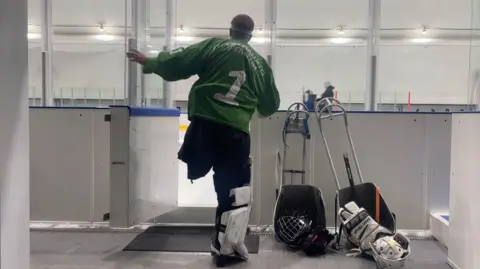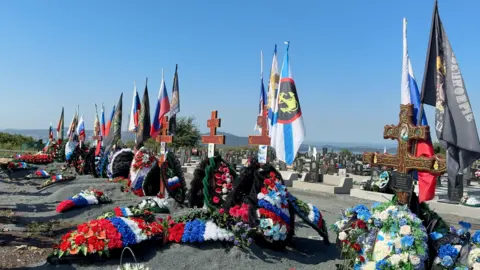In Vladivostok, amputee hockey players say Russia's war has reached the far east
Members of Soyuz, a Para ice hockey team, lost limbs while serving on the front line in Ukraine and now train in sleds as Russia faces Paralympic bans.
Vladivostok — more than 4,000 miles from the fighting in Ukraine — is home to a Para ice hockey team whose members say the war has reached them personally.
All of the players on Soyuz, the local Para ice hockey team, lost limbs while mobilised to fight in Ukraine and now train together at an ice rink in Russia's far east. They remove their prosthetic legs, sit in specially designed sleds and use hockey sticks with picks on the ends to propel themselves.

Thirty-year-old Dmitry Afanasyev said he was mobilised to fight in Ukraine. He described a moment when a mine hit near him. "A mine came flying towards me," he recalled. "I fell to the ground and could feel my leg burning. I looked down and everything was torn apart. I put on a tourniquet myself and told the guys to drag me out of there." He said his wife, a surgeon, messaged him after seeing a photograph of his injury: "They'll probably saw it off." "OK," he said. "Whether I have one leg, or two legs. Whatever."
Dmitry and his teammates train with aims that extend beyond rehabilitation. He said he hopes to become a Paralympic ice hockey champion. That ambition faces immediate obstacles: Russian teams were barred from the most recent Paralympic Games as a consequence of Russia's invasion of Ukraine, denying athletes the chance to compete under their national flag.
The players' path from the front line to the ice is a timeline of battlefield injury, emergency treatment and adaptation. After injury, many underwent amputations and prosthetic fitting, followed by physiotherapy and months of relearning balance and movement. Para ice hockey, which uses sleds mounted on skate blades and two sticks for both propulsion and puck handling, has become a focus for some as they rebuild physical fitness and team cohesion.
The transformation has been visible at the rink in Vladivostok. Players routinely leave their prosthetic limbs on the bench and strap into sleds. Training sessions emphasise core strength, stick-handling and coordination. Coaches and volunteers say the sport helps with both physical recovery and psychological adjustment to life after catastrophic injury.
The situation in Vladivostok underscores how the conflict in Ukraine has had effects deep inside Russia, touching remote regions and families far from the front line. The BBC's Russia editor, reporting from Vladivostok, said the players' experiences reflect a larger pattern of mobilisation that swept through many parts of the country and carried lasting consequences for those sent to fight.

Organisers and team members said the sport provides a structured environment for recovery and a possible route back to international competition should bans and sanctions be lifted. For now, the athletes juggle the realities of prosthetic care, continued medical assessment and the uncertainty that comes with sanctions on Russian sport.
Their presence on the ice is a visible reminder that the repercussions of the war extend beyond the battlefield and into daily life across Russia, including cities thousands of miles from the front.